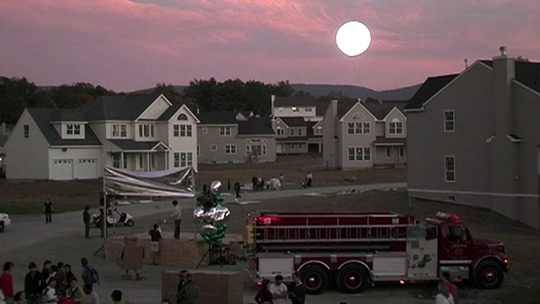Simon Pinkerton is a nebulous concept who lives with his wife and two sweet boys in London, England. He has the craziest expression!! Please read his stories and show him some love on Twitter @simonpinkerton
There are two jobs I’ve enjoyed in my life so far: delivering electronics for a department store (John Lewis), and working in a video-rental shop (Blockbuster Video).
At John Lewis, there were a couple of noteworthy adventures: I was chased out of an apartment block by a voodoo priest — almost naked, arcanely-painted, hair covered in a white powder, crazed eyes, spewing nonsense. When the customer called to ask why his TV hadn’t been delivered and I told him, he apologized and rescheduled for “a time when Rodney isn’t in the building.”
During another delivery, I was invited in by a thirty-something lady in a robe who had placed an order for a stereo. She had placed a sex toy on the dresser and eyed it, and me, suggestively when I asked her where she wanted me to stick it. She said, “to the side of the mirror please,” and promptly started masturbating on her couch as I knocked the vibrator (enormous) to one side and wired up her new stereo (eyes flicking to a reverse image of her reclined form, mind strangely transfixed on whether she was going at it clockwise or counter clockwise and how the mirror affected my perception of this). I wired it up incorrectly, or so I found out after I got back to the shop (she had called). But, fuck if I was going back there to fix it. I sent my friend Wayne, having told him the buyer was really friendly. He asked me how I managed to mess up such a routine installation, and I told him there had been something on my mind. I was confident he would be fine, as it was rumored he had been compelled to pay a Berlin prostitute double her usual price for a blow job at a bachelor party, such was his lack of romantic appeal. He never refuted the claim.
With regards to the latter job, proximity and laziness pulled and languidly pushed me to apply for and get a job at the Blockbuster Video right next to my home. I’m maybe writing about this as a nostalgia-piece for myself and my contemporaries because such a job doesn’t really exist anymore -- or if it does, I haven’t seen it for a long time anywhere near where I live in London.
For the benefit of younger readers, Blockbuster Video was a franchise of physical Netflix stores. Instead of scrolling through selections, you would enter the store and walk about looking. Upon making your selection, you would take an empty box representing your chosen tape or DVD or game cartridge to the desk where you would have a social encounter with a member of staff, who would take your box and swap it with a box of a videotape or DVD or game and then make a sarcastic comment about your choice before half-heartedly trying to upsell you M&Ms and bags of popcorn. Netflix doesn’t represent the old experience of video stores in a number of ways, but the main one for me is that there are no digital homeless people wandering around on your screen. Perhaps a future patch will rectify this omission?
Before too long I naturally excelled at stacking boxes, chatting with customers, selling M&Ms, and masturbating in the stock room, so I was functionally made the number three guy in my small store (a sort of manager’s assistant without either the concomitant extra wages or the badge with the star on it). I even impressed the big corporate bosses one time with my winning smile and attentive customer service -- this despite having lost my voice the previous night screaming at friends to be heard over 90s pop in a tawdry nightclub, and having an intermittent bass-baritone lower than Barry White. Extra responsibilities were layered onto my role until I was in charge of opening the shop most mornings and taking care of the necessary marketing and sales tasks that were beamed to me via what felt like magic (imagine the World Wide Web without a browser to view it on) and swathes of paper on a dot-matrixprinter (an old printer with shitty resolution).
Due to living next door, I was able to set my alarm for five minutes before opening-time (a generous 9 am), roll out of bed and into my uniform, and open the doors and start the printout. When there were no customers I would go back to my house and make breakfast, shower, and watch from the front window in case anybody arrived. At 9:30 I would go back in and settle myself behind the counter, steal and eat a chocolate bar, and then get up again and look for any new soft-core pornography DVDs that had arrived. Blockbuster didn’t carry the hard stuff because it was a family store, but it did carry some very odd, very loose parodies of popular films but with boobs, and occasionally what my co-worker Ben used to call biff hair.
When Ben would come in for the morning shift at around 10 or 11 am, I would demonstrate the new haul of erotica and we would play the most incredible-looking one on the store’s screens, fast-forwarding to the parts most likely to show boobs and biff hair. We’d watch it while we tidied and sorted the DVDs and merchandise and other miscellany. After this I would mostly be in the backroom doing the money stuff and he would be shop-side: he had the remote control in hand to stop the DVD when a customer came in, unless it was a homeless person in which case he just let it roll.
On many occasions we were nearly caught out by mothers who would come in early with their kids looking for cartoons on tape. Some were suspicious so I would tell them that when a tape or DVD was returned faulty it was our duty to check them on our equipment, but because some of the movies were unsuitable for children, we were obliged to stop them when children came into the store. This believable tale was all my own work, and Ben thought I was a genius.
On one occasion however, he hit pause instead of stop, and the three or four screens positioned strategically throughout the store framed a gigantic close-up of a vagina. I distinctly remember the lady who was in there at the time with three noisy children: she had jodhpurs and riding boots on, and she smelled vaguely of manure. I caught her eye as I popped my head out from the backroom, and I saw a fire in it — the kind of fire you see ignite in the eye of somebody sequacious who stumbles upon a situation in which they can be the centre of attention: the fire that shows a realization of control, of added power (especially bureaucratic/legal).
There are few situations as humbling and sleazy as getting berated in front of the whole staff by a manager the same age as you but much stupider, for watching really bad soft-porn while there were children in the store. At least I had Ben next to me to share my dry-mouthed, red-faced shame. We didn’t get fired, which was a bonus, but I was functionally demoted to number four in the hierarchy. A bearded man named Chris was now tasked with opening-up, and I was switched to evening shifts so I could be supervised at all times.
I never masturbated in the stock room again. I could barely look at the soft-core video boxes without feeling nauseated. When a man I knew who owned the toy store down the street returned a DVD of a pornographic Buffy the Vampire Slayer and apologetically said to me, “I thought it was the actual Buffy the Vampire Slayer” I didn’t sarcastically ask him why he would want to watch Buffy in his mid-40s, but instead took the DVD in hand, placed it behind me, and wistfully said, ”I understand. There’s no biff hair in that one is there?”
It was still a great job though. I got to rent up to seven movies or games a week, free-of- charge! Which in this age of streaming (stealing?) anything you want at any time and mostly anywhere gives my story a farcical bent to the modern Millennial.
But let me assure you, teens and young-twenties: back then, that many free rentals made me a king among men, and my witty disdain of your choice of movie was the talk of the local franchise.










